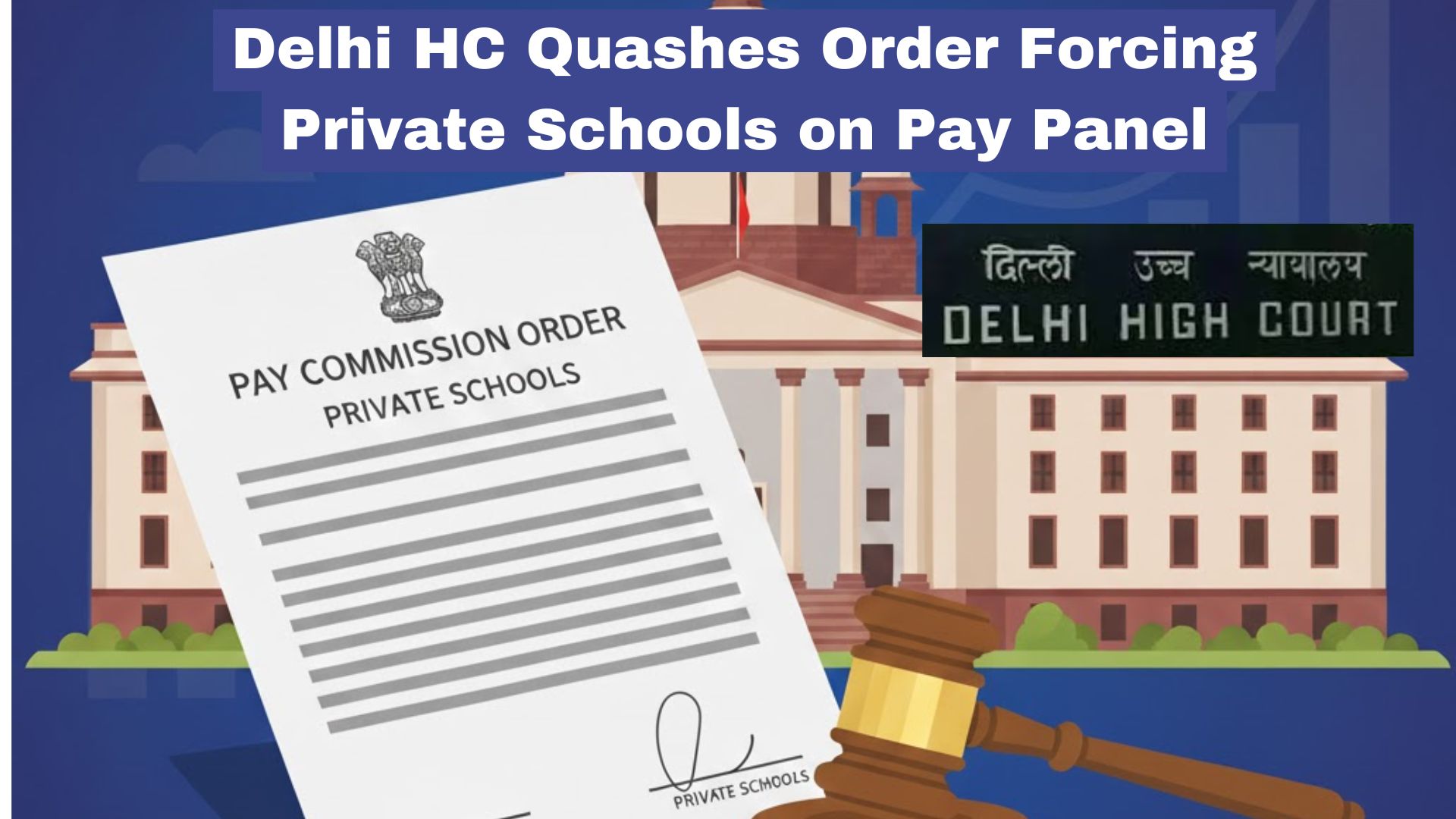
Delhi High Court Quashes Order Forcing Private Schools to Implement Pay Commission
Bench says single judge overlooked key legal issues raised by schools
Teachers’ pays dispute sent back for fresh hearing, no automatic CPC benefits
By Our Legal Reporter
New Delhi: October 29, 2025: In a significant ruling, the Delhi High Court Division Bench has set aside a November 2023 single-judge order that had directed private unaided schools in the national capital to implement the 6th and 7th Central Pay Commission (CPC) recommendations for their teaching and non-teaching staff.
The Bench of Justices Subramonium Prasad and Vimal Kumar Yadav observed that the earlier order failed to consider crucial arguments raised by schools, including the eligibility of teachers for CPC benefits, their mode of appointment, and the schools’ right to increase fees.
The Court also struck down the decision to form committees to examine salary payments and fee hikes, ruling that judicial functions cannot be delegated to committees.
Background of the Case
- In November 2023, a single judge of the Delhi High Court had ruled that private schools must pay their staff as per CPC norms, bringing them in line with government schoolteachers.
- The order also directed the formation of two high-powered committees to oversee salary implementation and fee structures.
- Several private schools challenged this decision, arguing that it was financially unsustainable and legally flawed.
Division Bench’s Observations
The Division Bench, while setting aside the order, made several important points:
- Judicial overreach: The single judge’s decision to form committees amounted to delegating judicial powers, which is not permissible.
- Unaddressed issues: The order did not properly examine whether teachers in private unaided schools are automatically entitled to CPC benefits.
- Fee regulation: The schools’ right to revise fees to meet higher salary obligations was not considered.
- Fresh hearing required: The matter has now been sent back for reconsideration by the single judge.
Why Schools Opposed the Order
Private schools argued that:
- They are not government-funded and cannot be forced to adopt CPC pay scales without corresponding fee adjustments.
- Many schools operate on tight budgets, and mandatory CPC salaries would lead to higher fees for parents.
- Teachers’ appointments in private schools differ from government schools, making automatic CPC parity unreasonable.
Teachers’ Perspective
On the other hand, teachers and staff argued that:
- They perform the same duties as government schoolteachers and deserve equal pay for equal work.
- Many private schools charge high fees from parents but still pay teachers much lower salaries.
- Implementing CPC norms would ensure job security, fair wages, and social dignity.
Legal Significance
The ruling highlights a delicate balance between:
- Protecting the rights of teachers to fair wages.
- Ensuring financial autonomy of private schools.
- Preventing judicial overreach by keeping courts within their constitutional role.
The Division Bench clarified that courts cannot outsource judicial decisions to committees, as this undermines the independence of the judiciary.
Wider Implications
This case has implications beyond Delhi:
- Across India, private schools face similar disputes over whether CPC pay scales should apply to them.
- The ruling may influence future litigation in other states.
- It also raises questions about education affordability, since higher salaries could mean higher school fees.
Expert Reactions
- Education lawyers welcomed the ruling, saying it restores judicial discipline and ensures that complex financial issues are properly examined.
- Teachers’ unions expressed disappointment, arguing that the decision delays long-awaited pay parity.
- Parents’ associations are divided: some fear fee hikes, while others support better pay for teachers.
What Happens Next
- The case will now return to a single judge of the Delhi High Court for a fresh hearing.
- Both schools and teachers will present their arguments again.
- The Court will have to decide whether CPC benefits can be legally enforced on private unaided schools, and if so, under what conditions.
Conclusion
The Delhi High Court’s decision to quash the earlier order marks a turning point in the ongoing debate over teachers’ salaries in private schools. While the ruling provides relief to schools for now, it leaves the larger question unresolved: Should private school teachers be paid at par with government schoolteachers?
The fresh hearing will be closely watched, as it could shape the future of private education, teacher welfare, and fee regulation in India.
ALSO READ POPULAR ARTICLES
-
Supreme Court Halts GST Assessment on Joint Development Deals
-
Supreme Court Explains Demurrer Law in Neelkanth Realty Case
-
Supreme Court Opens Door for Vodafone Idea Relief in AGR Case
-
Delhi High Court Rules No Alimony for Financially Independent Spouse
-
Akshay Kumar Moves NCLAT Against Edtech Firm Over ₹4.83 Cr Dispute
-
SC Quashes Chhattisgarh Tender Clause Favoring Local Bidders
-
SC to Examine Validity of Securities Transaction Tax on Trading
-
SC Defers Vodafone Idea ₹5,606 Crore AGR Dues Hearing to Oct 13
-
Punjab & Haryana HC: Bail Can’t Be Cancelled for Seeking Hearing Exemptions
-
Delhi HC Protects Mankind Pharma’s ‘Kind’ Trademark, Bars Similar Names
-
Delhi HC Appoints Justice Rajiv Shakdher as Arbitrator in Playboy Bar Dispute
-
Karisma Kapoor’s Kids Challenge Sunjay Kapur’s Will in Delhi HC
-
SC Questions Dual Madras HC Hearings, Reserves Verdict on TVK Plea
-
SC Lets Judicial Officers With 7 Years Bar Apply for District Judge
-
SC to Hear Vijay’s TVK Plea Against SIT Probe in Karur Stampede
-
SC Probes Financial Irregularities in Indiabulls Housing: ED
-
Delhi HC Quashes 22-Year-Old Case Against Lawyer Over Basement Office
-
SC Seeks Rehab Plan for Cadets Injured During Military Training
-
SC PIL Seeks CBI Probe, Nationwide Review on Cough Syrup Deaths
-
Delhi HC Hikes Land Compensation for Yamuna Project Villagers
-
Punjab & Haryana HC: Bail Can’t Be Denied Over No Permanent Home
-
SC: Appellate Courts Can Correct Trial Court Evidence Errors